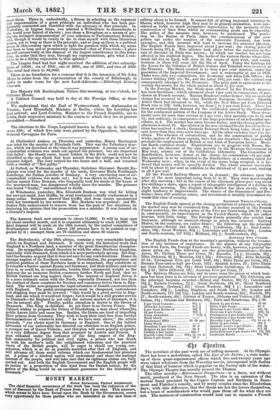The Fedrelanekt, of the 28th ultimo, contains a very remarkable
leading article on England and Denmark. It starts with the historical truth that England is a Northern land, a member of the great Scandinavian champion- ring. Its sympathies should therefore be with the other Northern kingdoms, especially with Denmark, from which it is more particularly sprung. But Eng- land has become so great that it does not care for any confederations. Hence its strange neglect of its Northern cousins. Nevertheless, the geographical and political position of these Northern lands is so important, they constitute so invaluable a barrier against Russia and Germany, and their military and naval force is, or could be, so considerable, besides their commercial weight as the highway for an immense British commerce further North and East, that no British Cabinet can long neglect them. The interest of England drives it to a more intimate union with the North, especially Denmark, not less than the instinct of these countries for freedom and commerce drives them to Eng- land. The writer now proposes the rapid extension of Danish communication with England. The postal arrangements must be cheapened, customhouse and shipping dues must be lowered : "this would be a great service to Eng- land, and one which it would not forget ; but it would be a still greater service to Denmark—for England is not only the natural market of Denmark, it is also its natural ally." Finally, public attention is drawn to the throne of Denmark. The King is childless. As yet there is no Crown Prince. The 'Cabinet wishes to propose the Prince of Glucksburg, a man about whom:the public knows little and cares less. Besides, the Danes are tired of importing their princes from Germany. They wish to keep their land free from further Germanizations of whatever kind. "As we have seen above," the article proceeds, "our choice must be Germany or England. One of the boldest advocates of our nationality has directed our attention to an English prince, a younger son of Queen Victoria; and this plan will meet popular sympathy in a very different degree from that proposed by Austria and Prussia. I man educated under the influence of the deep respect of the Eng- lish community for political and civil rights, a prince who has drunk in with his mother's milk the enlightened toleration and the practical views of the British people, will be eager to shield our young con- stitution, which is as far as possible modelled after that of England, and will advance all those social reforms which our fundamental law promises us. A prince of a kindred nation will understand and share the national interest of the people, and will take care that its righteous claims are fully carried out. And both the English Government and the English people will & justice to a proposition of this kind from the Danish nation, for the person of the King would be an excellent guarantee for the friendship of Denmark."


























 Previous page
Previous page